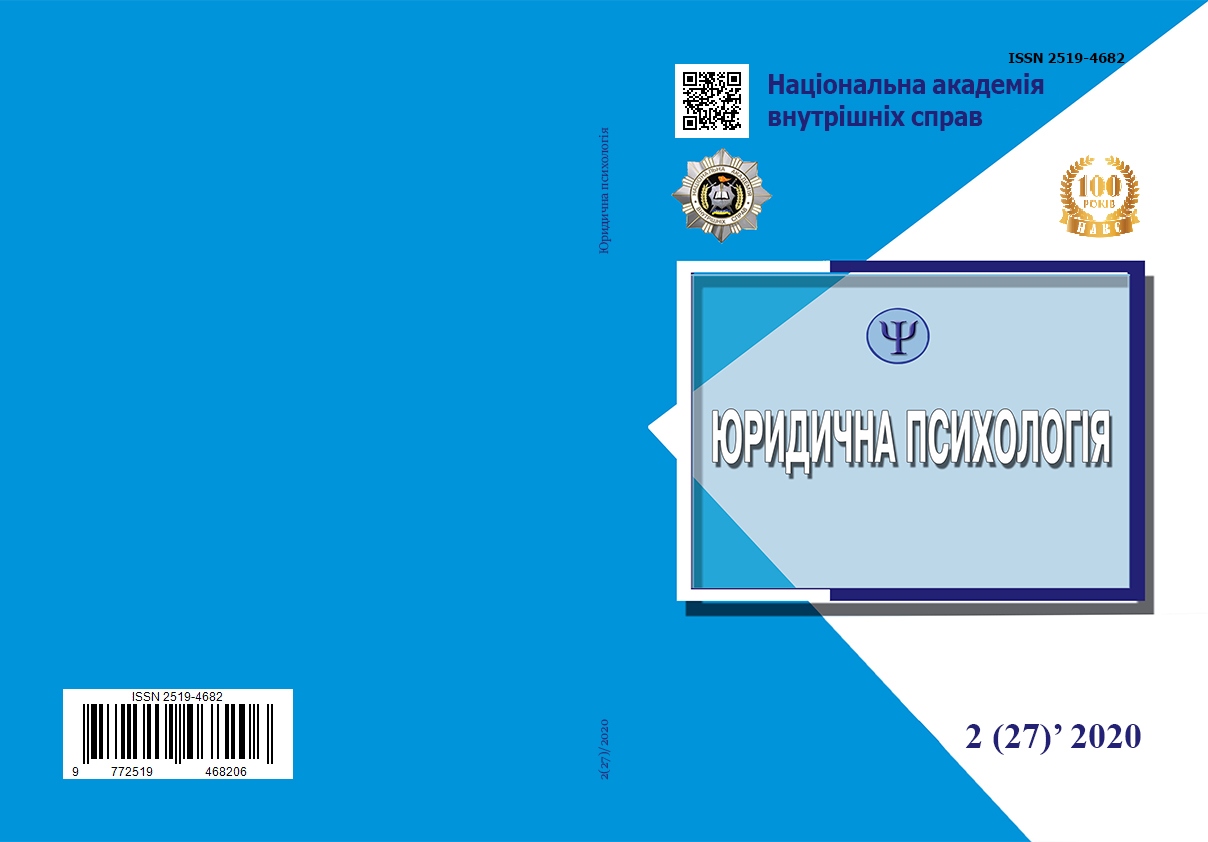Features of Emergency Psychological Assistance in Different Psychophysical Reactions of Personality
Abstract
The purpose of the article is to study the question of the peculiarities of providing emergency psychological care for various psychophysical reactions of the individual The methodological basis of the article was formed by scientific concepts of studying individual psychological aspects of providing psychological assistance. The features of the influence of extreme situations and stress on the psychoemotional state of the individual are considered. The role of the dynamics of experiencing a traumatic situation and states arising as a result of personality traumatization is revealed. Depending on this, the main types of reactions to stressful situations, their forms and manifestations are determined. The activity of practicing psychologists in working with persons who find themselves in emergency situations is analyzed. The negative influence of extreme situations and the psyche of the individual are determined, and the main types of psychoemotional reactions that arise immediately after an emergency are determined. The features of the experience of an affective state and the features of its course are revealed. The scientific novelty of the article lies in the generalization and systematization of research results on the features of the provision of emergency psychological assistance for various psychophysical personality reactions as a result of experiencing a traumatic situation. Conclusions. A number of practical recommendations that should be used in the provision of psychological assistance are identified and the main caveats are considered. The effectiveness of the approaches used in organizing the provision of emergency psychological assistance to a person who has fallen into emergency conditions has been substantiated. The role of the psychological assistance service, their basic functions, and the basic principles of providing psychological assistance are determined.
Keywords: psychological assistance; psychophysical reactions; delirium; nervous trembling; crying; extreme situations; state dynamics; emergency psychological assistance; stress; affect.
Downloads
References
Aleksandrovsky U. A. Disasters and Mental Health. Disasters and Mental Health. 2020. P. 1–144. doi: 10.33029/9704-5917-1-kat-2020-1-144.
Antipov A. Neuroethics and mental health: points of contact. Neuroscience for Medicine and Psychology. 2019. doi: 10.29003/m302.sudak.ns2019-15/66-67.
Bogosian A. Cultivating psychological skills. Living Well with A Long-Term Health Condition. 2020. P. 108–128. doi: 10.4324/9781315453576-6.
Chappell A. T. Police academy training: comparing across curricula. Policing: An International Journal. 2008. No. 1. Vol. 31. P. 36–56. doi: https:doi.org/10.1108.
Эльзессер А. С. Психологическая помощь персоналу организаций: профилактика тревожных и депрессивных расстройств. Психолог. 2018. № 5 (5). С. 34–40. doi: 10.25136/2409-8701.2018.5.27507.
Evdokimova E. V. Psychological Support For The Middle Age In A Crisis Condition. PSYRGGU. 2019. Vol. 64. doi: 10.15405/epsbs.2019.07.20.
Филатов Ф. Р., Седых Н. С. Психологическая помощь пострадавшим в результате терактов: критический анализ и перспективы развития. Психология и Психотехника 2015. № 7 (7). С. 735–744. doi: 10.7256/2070-8955.2015.7.15548.
Geležėlytė O., Gailienė D., Latakienė J., Mažulytė-Rašytinė E., Skruibis P., Dadašev S., Grigienė D. Factors of Seeking Professional Psychological Help by the Bereaved by Suicide. Frontiers in Psychology. 2020. No. 11. doi: 10.3389/fpsyg.2020.00592.
Goldstein M. G., Niaura R. Psychological Factors Affecting Physical Condition. Psychosomatics. 1992. No. 33 (2). P. 134–145. doi: 10.1016/s0033-3182(92)71989-6.
Галич М. Ю. Особливості динаміки емоційних станів поліцейських-учасників операції об’єднаних сил у реабілітаційний період : дис. … канд. психол. наук : 053. Київ, 2020. С. 207 URL: http://elar.naiau.kiev.ua/jspui/handle/123456789/17885.
Kachur I. V., Karamzina L. A. Research of the Intellectual Helmet Device: a Psychophysiological Aspect. Ukraïnsʹkij Žurnal Medicini, Bìologìï Ta Sportu. 2020. No. 5 (3). P. 426–431. doi: 10.26693/jmbs05.03.426.
Корольчук М. С., Крайнюк В. М. Соціально-психологічне забезпечення діяльності у звичайних та екстремальних умовах : навч. посіб. Київ : Ніка-Центр, 2006. 580 с.
Lannin D. G. The effect of self-affirmation on stigma associated with seeking psychological help. 2012. doi: 10.31274/etd-180810-2560.
Лозінська Н. Психотравма як наслідок травматичного стресу в різних напрямках сучасної психології.
Вісник Національного Університету Оборони України. 2019. № 50 (2). С. 65–73. doi: 10.33099/2617-6858-2018-50-2-65-73.
Mehrotra V. Help Us Help You. October 2, 2006. doi: 10.1287/orms.2006.05.05.
Niaura R., Goldstein M. G. Psychological Factors Affecting Physical Condition. Psychosomatics. 1992. No. 33 (2). P. 146–155. doi: 10.1016/s0033-3182(92)71990-2.
Stefano A., Ristori J., Limoncin E. Psychological Features. Trends in Andrology and Sexual Medicine. 2020. P. 199–208. doi: 10.1007/978-3-030-51410-5_24.
Tavner P., Li Ran, Crabtree C. Introduction to condition monitoring. Condition Monitoring of Rotating Electrical Machines. 2020. P. 1–15. doi: 10.1049/pbpo145e_ch1.
Екстремальна психологія : підручник / за заг. ред. О. В. Тімченка. Київ : Август Трейд, 2007. 502 с.
Violanti J. M. Police organizational stress: the impact of negative discipline. Int J Emerg Ment Health. 2011. No. 13 (1). P. 31–36. doi: 10.1093/shm/hky016.
Yastochkina I. Personal anxiety as socio-psychological problem. Lviv University Herald. 2020. No. 6. P. 165–170. doi: 10.30970/2522-1876-2020-6-24.
Зуб А. Т. Кризис как системная дезадаптация. Научный Диалог: Экономика и Менеджмент : сб. науч. тр. X Междунар. науч.-практ. конф. (Санкт-Петербург, 8 нояб. 2017 г.). СПб. : Обществ. наука, 2017. 68 с. doi: 10.18411/spc-8-11-2017-08.
Abstract views: 349 PDF Downloads: 4639
- Authors reserve the right to authorship of their own work and transfer to the magazine the right of the first publication of this work under the terms of the Creative Commons Attribution License, which allows other persons to freely distribute published work with mandatory reference to authors of the original work and the first publication of an article in this magazine.
- Authors have the right to enter into separate additional agreements on non-exclusive dissemination of the work in the form in which it was published in the journal (for example, to post an article in the institution's repository or to publish as part of a monograph), provided that the link to the first publication of the work in this journal is maintained.
- The journal's policy allows and encourages the posting of articles by authors on the Internet (for example, in electronic storehouses of institutions or on personal websites), both before the submission of this manuscript to the editorial office and during its editorial processing, as this contributes to the creation of a productive scientific discussion and positively affects the efficiency and dynamics of citing the published work.




